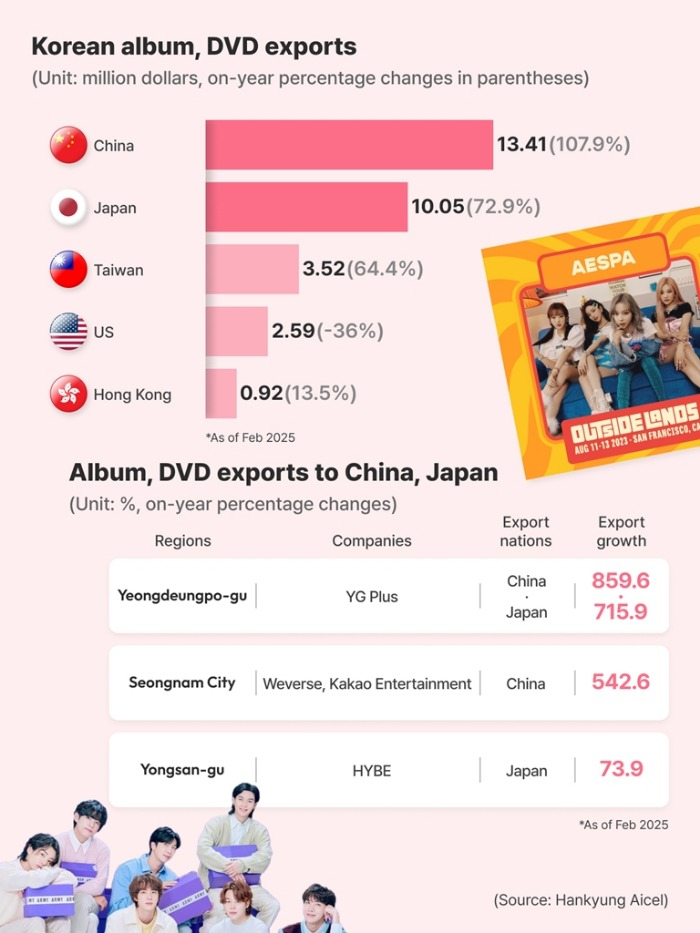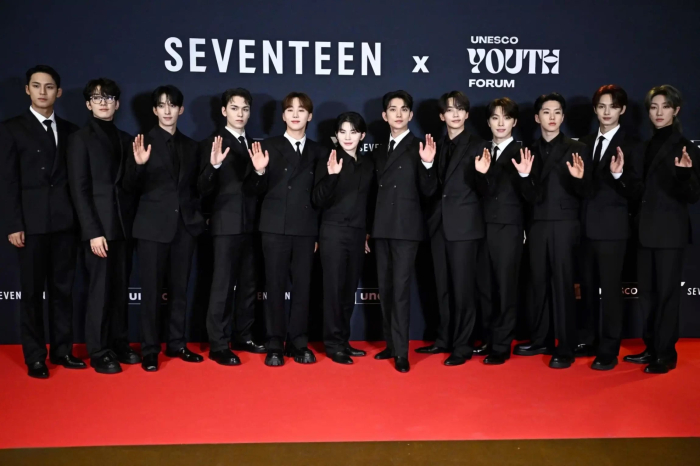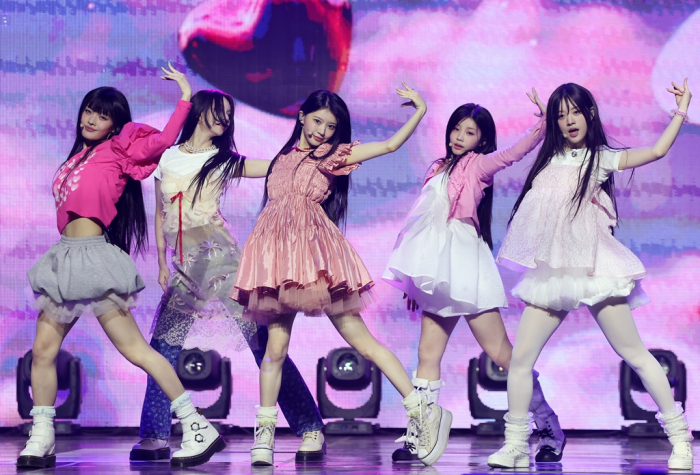K-pop
K-pop exports boom as end of Chinese K-wave ban looms large
Korean entertainment stocks rally as music album exports to China and Japan surge
By Mar 31, 2025 (Gmt+09:00)
4
Min read
Most Read
LG Chem to sell water filter business to Glenwood PE for $692 million


KT&G eyes overseas M&A after rejecting activist fund's offer


Kyobo Life poised to buy Japan’s SBI Group-owned savings bank


StockX in merger talks with Naver’s online reseller Kream


Meritz backs half of ex-manager’s $210 mn hedge fund



Exports of Korean popular music, or K-pop, have seen a significant surge in recent months, driven by increasing demand from China and Japan, according to recent industry data.
With rising exports and strong fandoms in key Asian markets, K-pop is poised for another year of impressive growth, reinforcing its status as one of Korea’s most lucrative cultural exports, analysts said.
The growing influence of groups like Blackpink, Seventeen, aespa and ILLIT, coupled with the expected return of some members of global boy band sensation BTS upon completion of their military service, has contributed to a sharp rise in overall music album and DVD exports.
Investors are increasingly optimistic about the financial prospects of Korean entertainment companies and their shares as the sector is often seen as a “tariff-free" haven.”
According to the Korean alternative data platform KED Aicel, Korea’s album and DVD export revenue reached $20.13 million in the first 20 days of March, up 6.4% from the year-earlier period.

In February, exports jumped 46.1% to $36.25 million, marking two consecutive months of on-year growth.
China was the standout market, with Korea’s exports to the country in February soaring 107.9% on-year to $13.41 million.
In the first 20 days of March, exports to China surged by 232% to $9.98 million.
While Japanese exports showed a temporary slowdown this month, February saw a sharp 72.9% increase to $10.05 million.
As of February, China and Japan accounted for 64.7% of total Korean album and DVD exports.

ENTERTAINMENT HUBS IN SEOUL
Regional data showed strong performances from key entertainment hubs.
YG Entertainment Inc.’s distribution subsidiary, YG Plus Inc., based in Yeongdeungpo-gu, and HYBE Co.’s headquarters in Yongsan-gu, Seoul, led the export growth.
In February, Chinese exports from Yeongdeungpo-gu skyrocketed 859.6% from a year earlier, while Japanese exports grew 715.9%.
Top-selling albums included Blackpink member Jisoo’s Amortage and virtual idol group Plave’s Caligo Pt.1.

Yongsan-gu saw a 73.9% rise in exports to Japan, fueled by expectations of BTS members J-Hope and Jin’s return to the boyband this year after their military service.
“Since last month, expectations of China lifting its unofficial ban on Korean entertainment, or Hallyu, have strengthened K-pop fandom support,” said iM Securities analyst Hwang Ji-won. “Meanwhile, in Japan, K-pop now accounts for 31% of the Oricon Singles Chart Top 30, highlighting the success of localization strategies.”
K-pop export data for the entire month of March will be available at KED Aicel in early April.
KED Aicel is the alternative data service brand of Hankyung Aicel, renamed from Aicel Technologies Inc. after The Korea Economic Daily acquired the data firm from US-based policy and global intelligence provider FiscalNote Holdings Inc. for $8.5 million last October.

K-POP FANDOMS STRENGTHENING IN CHINA, JAPAN
Chinese fans' enthusiasm for K-pop idols is evident across digital platforms.
On Douyin, China’s TikTok equivalent, SM Entertainment Co.’s aespa and HYBE’s Seventeen dominate in popularity.
Aespa, with 2.93 million followers, recorded 170 million likes as of March 20 – the highest among all Korean acts. Seventeen, with 2.25 million followers and Enhypen, with 1.55 million followers, had 150 million and 89.72 million likes, respectively.
In Japan, emerging Korean idol groups like HYBE’s ILLIT and YG Entertainment’s BabyMonster have gained popularity.
Google searches for ILLIT in Japan from March 23 to 29 more than doubled compared to four weeks prior, while BabyMonster searches increased by over 20% in the same period.

“Since the downfall of Japan’s entertainment giant Johnny & Associates due to a sexual abuse scandal, Korean entertainment firms have aggressively expanded in Japan to absorb its displaced fanbase, yielding substantial results,” said a hedge fund analyst.
BULLISH OUTLOOK FOR ENTERTAINMENT STOCKS
Securities firms are optimistic about K-pop’s financial performance this year.
HYBE, in particular, is gaining attention due to the anticipated full-group comeback of BTS.
“If BTS resumes group activities this year, HYBE could generate an additional annual profit of 300 billion won ($204 million),” said a fund manager.

Entertainment stocks have performed strongly this year, led by SM Entertainment and YG Entertainment.
Shares of SM Entertainment have risen 41.5% year to date, while YG Entertainment and YG Plus have climbed 38.6% and 41.6%, respectively.
YG Entertainment is set to benefit from Blackpink’s expected comeback as a group in the second half, while SM Entertainment is gearing up for new releases from aespa and Riize.
Write to See-Eun Lee at see@hankyung.com
In-Soo Nam edited this article.
More to Read
-
 Food & BeverageKorean snacks mesmerize global consumers amid K-pop popularity
Food & BeverageKorean snacks mesmerize global consumers amid K-pop popularityMar 10, 2025 (Gmt+09:00)
4 Min read -
 EarningsHYBE Q3 profit down; foresees better 2025 after BTS’ military discharges
EarningsHYBE Q3 profit down; foresees better 2025 after BTS’ military dischargesNov 05, 2024 (Gmt+09:00)
2 Min read -
 K-popBlackpink Rosé’s APT. debuts at No. 8 on Billboard Hot 100
K-popBlackpink Rosé’s APT. debuts at No. 8 on Billboard Hot 100Oct 29, 2024 (Gmt+09:00)
2 Min read -
 K-popBTS Jin previews new song ‘I’ll Be There' ahead of release of his solo album
K-popBTS Jin previews new song ‘I’ll Be There' ahead of release of his solo albumOct 25, 2024 (Gmt+09:00)
1 Min read -
 EconomyBTS, Blackpink economy: Korea’s IP rights trade surplus hits record high
EconomyBTS, Blackpink economy: Korea’s IP rights trade surplus hits record highMar 21, 2024 (Gmt+09:00)
2 Min read -
 K-popBlackpink to hold K-pop’s first in-game concert on PUBG mobile game
K-popBlackpink to hold K-pop’s first in-game concert on PUBG mobile gameJul 12, 2022 (Gmt+09:00)
2 Min read
Comment 0
LOG IN


